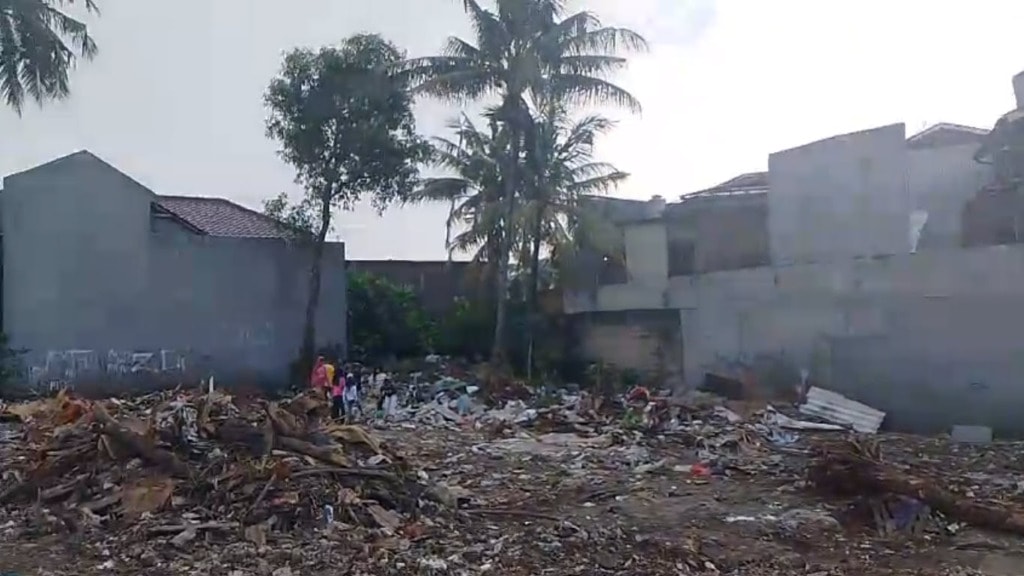In the bustling outskirts of Jakarta, where gleaming shopping malls cast long shadows over informal settlements, a community of trash pickers we’ve worked with for years recently witnessed their world literally being flattened to the ground. These aren’t just statistics – they’re families we know intimately, who for two decades made a living by collecting and sorting Jakarta’s refuse, creating value from what others discard.
In early November, about 20 families – including 27 children – were forced to evacuate the place they’ve called home for 20 years. It’s a story that epitomizes the precarious existence of Jakarta’s informal workers, caught between the city’s rapid development and survival.
This Time, The Threats Were Real
“We’ve heard eviction rumors dozens of times over the years,” the families told us. “But this time was different.” Week after week, strangers arrived with legal papers, until the reality became impossible to ignore. The community’s heartbeat – the lapaks, or waste collection points – fell silent first. These crucial hubs, where trash pickers sort and store recyclables before sale, required substantial space that’s now impossible to find in their new circumstances.
The Death of a Neighborhood
The demolition erased more than just homes. It wiped away years of community infrastructure: communal bathrooms, water reservoirs, and modest houses that we and other aid organizations had built together with the community. The land’s ownership, like many parcels in Indonesia’s complex property landscape, sits in a gray area. Property developers, armed with capital and connections, can often navigate these murky waters more successfully than the urban poor who’ve made these spaces livable.
Survival Math: $70 Rent on a $100 Income
The financial mathematics is brutal. Families who previously paid only for electricity now face monthly rents of around $70 – a crushing burden when monthly incomes hover around $100, if they’re lucky. Yet they must stay nearby, tethered to their trash collection routes and their children’s schools.
Education Hangs in the Balance
But amid this displacement, we’ve witnessed remarkable resilience. Most families have found new rentals, struggling to balance proximity to their collection routes with their children’s education. Of the 27 children affected, only three returned to their villages. The rest continue their schooling, though their parents’ new financial strains cast shadows over their educational future.
Jakarta’s Hidden Recyclers
This isn’t just about housing; it’s about the invisible infrastructure of urban recycling. These trash pickers, whom we’ve supported since 2004, are actually environmental entrepreneurs, creating value from what society discards. They’re the unofficial recycling system of Jakarta, operating in the margins of the city’s consciousness.
The story of Jakarta’s trash pickers reflects a broader pattern in developing megacities – the constant tension between urban development and the survival economies of the poor. As one community leader told us, “No one cares about trash pickers anyway.” But we at XSProject know differently. They’re not just picking through Jakarta’s trash; they’re picking up the pieces of a broken system, trying to build better lives for their children in the process.
The Price of “Progress”
As Jakarta continues its march toward modernization, the question remains: How do we balance progress with the protection of our most vulnerable citizens? While we continue to support these families, particularly focusing on their children’s education, the answer to this larger question may lie not in the gleaming towers rising above the city, but in the stories of those who’ve made homes in their shadows.
The Impact on Community Resources and XSProject’s Response
The physical toll of this eviction extends beyond individual homes. Over the years, XSProject had helped build vital community infrastructure – multiple communal bathrooms, water reservoirs, and modest housing units – all now reduced to rubble. Fortunately, our permanent community center, situated on legal land a short distance away, remains intact and continues to serve as a crucial hub for our educational and support programs.
In immediate response to this crisis, we’re providing food parcels to affected families, offering some relief as they grapple with new rental costs that consume most of their monthly earnings. However, this is just the beginning of what these families will need to remain stable and keep their children in school.
How You Can Help
You can help XSProject support this community through this period of upheaval and immense financial strain. Your support can help us provide the resources to keep children in school – ensuring that this housing crisis doesn’t become an educational crisis for the next generation.
While the community’s physical location has changed, our commitment to these families remains unwavering. Their resilience inspires us, but they shouldn’t have to face these challenges alone. Join us in supporting Jakarta’s trash picker families as they rebuild their lives and secure their children’s futures.

